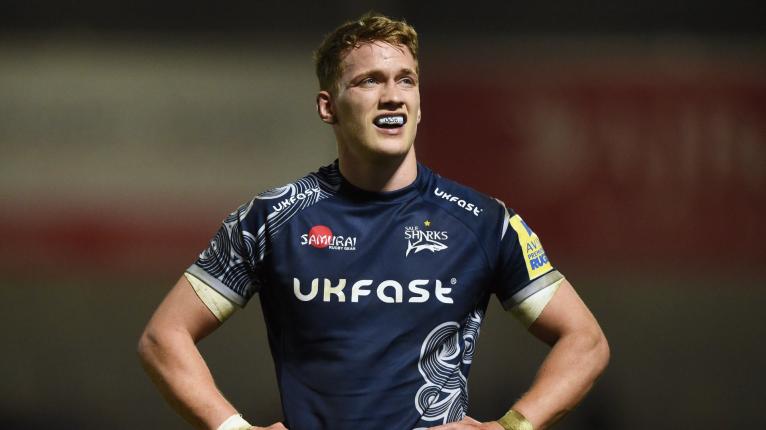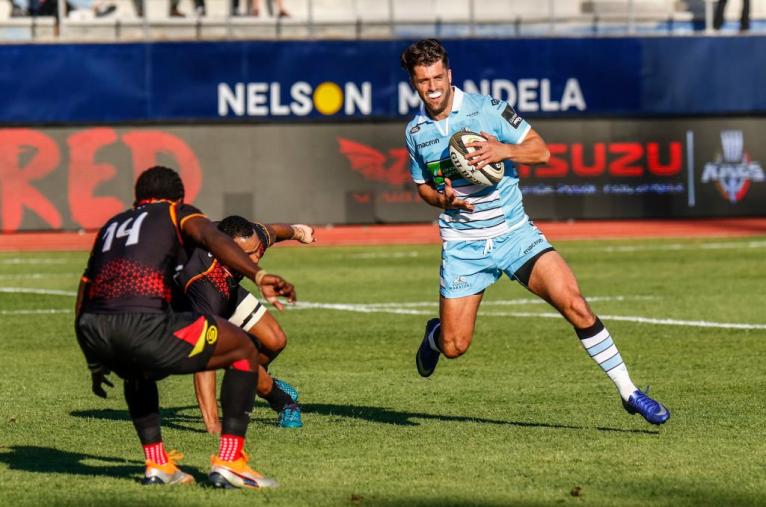England haemorrhage players as Irish, Welsh and Scottish exiles programs thrive

Two names have caught the eye in the international squads selected so far this weekend, with Jonah Holmes and Sam Skinner joining up for the first time with Wales and Scotland respectively.
Both former England U20 representatives, Holmes and Skinner are just the latest in a growing line of players identified by the exiles programs that the Irish, Scottish and Welsh unions have put in place.
With England’s sizeable player pool and close links to the three countries, there are a bevvy of players eligible for the Celtic nations who may not get the opportunity to play for England due to competition for spots, so those nations have been proactive in adding to their more limited player pools.
There are likely to be more names joining the list, too, with both Mike Haley and Will Addison having traded in life at Sale for moves to Irish provinces in the summer and both have eyes on a green jersey in the coming months.
We take a look at the recent cross-border poaches that illustrate the impressive work that those exiles programs are doing.

Ireland
Kieran Treadwell, Ulster
Kieran Marmion, Connacht
Ireland have been more discerning with their selections, partly due to the fact they have a strong player pool in place already and partly due to the fact they need to bring players over to one of the provinces before they are able to cap them.
Haley and Addison should soon be added to this list, whilst the likes of Billy Burns, Sam Arnold, James Mitchell, Joe Maksymiw and Ciaran Parker could join them in the future.
Scotland
Adam Hastings*, Glasgow Warriors
James Lang, Harlequins
Chris Harris, Newcastle Falcons
Darryl Marfo, Edinburgh
Ali Price, Glasgow Warriors
Huw Jones*, Glasgow Warriors
Kieran Low, unattached
Duncan Taylor, Saracens
Greig Tonks, London Irish
Ryan Wilson, Glasgow Warriors
Tom Heathcote*, unattached
Henry Pyrgos, Edinburgh
*Hastings, Jones and Heathcote were all born in Scotland but moved to England for school, with all three coming through the Bath academy. Jones and Heathcote moved to England as young children
With just two professional teams, Scotland have been a lot more aggressive than Ireland in terms of identifying talent in England that is eligible to represent them. In addition to the English players they have identified, the likes of Luke Hamilton, Byron McGuigan and Tim Visser have also been targeted in recent years.

Wales
Tomas Francis, Exeter Chiefs
Ross Moriarty, Dragons
Jake Ball, Scarlets
If Holmes makes his debut next month, he’ll add his name to a list of three players who have made a significant impact in Welsh rugby in recent years.
Although it may frustrate Gallagher Premiership clubs and their attempts to meet English-qualified player quotas, as long as these exiles programs continue to deliver quality players for their nations, don’t expect them to go anywhere anytime soon, especially with the likes of Johnny Williams, Cam Redpath and Sam Moore still be fought over.
Watch: Warren Gatland talks about his Wales squad for the autumn internationals, including the new addition Jonah Holmes.










































Comments on RugbyPass
Well where do you start, the fact that England have a professional domestic league and Ireland’s is fully amatuer, that they have fully seperated professional squads at Fifteens and Sevens (7’s thinly disguised as GB), and Ireland have fully pro Sevens squad who loan some players back to the Semi-Professional Fifteens squad (moved from amateur for only a year or so) for a few games at 6N & RWC’s. The Women’s games is a shambles, and is at risk of killing itself by pushing for professionalism when the market isn’t really there to support it outside one or two countnries..
2 Go to commentsWayne Smith's input didn't have as much impact on the last final as Davison's red card for Thompson. England were 14 points up and flying when that happened.
2 Go to commentsBilly's been playing consistently well for 2 - 3 seasons now and deserves a look in at the top level. Ioane and ALB are still first choice but there needs to be injury cover and succession. His partnership with Jordie gives him first dibs you'd think. Go the Hurricanes.
3 Go to commentsIt’s not up to Wales to support Georgian Rugby. That’s up to International Rugby and Georgia. I sympathise with Georgia’s decent attempt to create this fixture. But for Wales the proposed match up is just a potential stick to beat them with and a potential big psychological blow that young Welsh team doesn’t need. (I’m Irish BTW.)
2 Go to commentsCale certainly looks great in space, but as you say, he has struggled in contact. At 23 years old, turning 24 this year, he should be close to full physical maturity and yet there exists a considerable gap in the power and physicality required for international rugby. Weight doesn’t automatically equate to power and physicality either. Can he go from a player who’s being physically dominated in Super rugby to physically dominating in international rugby in 1 or 2 years? That’s a big ask but he may end up being a late bloomer.
28 Go to commentsIf rugby wants to remain interesting in the AI era then it will need to work on changing the rules. AI will reduce the tactical advantage of smart game plans, will neutralize primary attacking weapons, and will move rugby from a being a game of inches to a game of millimetres. It will be about sheer athleticism and technique,about avoiding mistakes, and about referees. Many fans will find that boring. The answer is to add creative degrees of freedom to the game. The 50-22 is an example. But we can have fun inventing others, like the right to add more players for X minutes per game, or the equivalent of the 2-point conversion in American football, the ability to call a 12-player scrum, etc. Not saying these are great ideas, but making the point that the more of these alternatives you allow, the less AI will be able to lock down high-probability strategies. This is not because AI does not have the compute power, but because it has more choices and has less data, or less-specific data. That will take time and debate, but big, positive and immediate impact could be in the area of ref/TMO assistance. The technology is easily good enough today to detect forward passes, not-straight lineouts, offside at breakdown/scrum/lineout, obstruction, early/late tackles, and a lot of other things. WR should be ultra aggressive in doing this, as it will really help in an area in which the game is really struggling. In the long run there needs to be substantial creativity applied to the rules. Without that AI (along with all of the pro innovations) will turn rugby into a bash fest.
24 Go to commentsSouth Africa rarely play Ireland and France on these tours. Mostly, England, Scotland and Wales. I wonder why
2 Go to commentsIt was a let’s-see-what-you're-made-of type of a game. The Bulls do look good when the opposition allows them to, but Munster shut them down, and they could not find a way through. Jake should be very worried about their chances in the competition.
2 Go to commentsHats off to Fabian for a very impressive journey to date. Is it as ‘uniquely unlikely’ as Rugby Pass suggests, given Anton Segner’s journey at the Blues?
1 Go to commentsSad that this was not confirmed. When administrators talk about expanding the game they evidently don’t include pathways to the top tier of rugby for teams outside of the old boys club. Rugby deserves better, and certainly Georgia does.
2 Go to commentsLions might take him on if they move on Van Rooyen but I doubt he will want to go back, might consider it a step backwards for himself. Sharks would take him on but if Plumtree goes on to win the challenge cup they will keep him on. Also sharks showing some promising signs recently. Stormers and Bulls are stable and Springboks are already filled up. Quality coach though, interesting to see where he ends up
1 Go to commentsAnd the person responsible for creating a culture of accountability is?
3 Go to commentsMore useless words from Ben Smith -Please get another team to write about. SA really dont need your input, it suck anyway.
264 Go to commentsThis disgraceful episode must result in management and coach team sackings. A new manager with worse results than previous and the coaching staff need to coached. Awful massacre led by donkeys.
1 Go to commentsInteresting article with one glaring mistake. This sentence: “And between the top four nations right now, Ireland, France, South Africa, and New Zealand…” should read: And between the top four nations right now, South Africa, Ireland, New Zealand and France…”. Get it right wistful thinkers, its not that hard.
24 Go to commentsHow did Penny get the gig anyway?
3 Go to commentsNice write up Nick and I would have agreed a week ago. However as you would know Cale & co got absolutely monstered by the Blues back row of Sotutu, Ioane and Papaliti and not all of these 3 are guaranteed a start in the Black jumper. He may need to put some kgs before stepping up, Spring tour? After the week end Joe will be a bit more restless. Will need to pick a mobile tough pack for Wales and hope England does the right thing and bashes the ABs. I like your last paragraph but I would bring Swinton, Hannigan into the 6 role and Bobby V to 8
28 Go to commentsThe Crusaders can still get in to the Play Off’s. The imminent return of outstanding captain Scott Barrett and his All Black team mate Codie Taylor will be a big boost.There are others like Tamaiti Williams too. Two home games coming up. Fellow Crusader fans get there and support these guys. I will be.
2 Go to commentsCant get more Wellington than Proctor.
3 Go to commentsWhy not let the media decide. Like how they choose the head coach. Like most of us we entrust the rugby system to choose. A rugby team includes the coaches. It's collective.
14 Go to comments